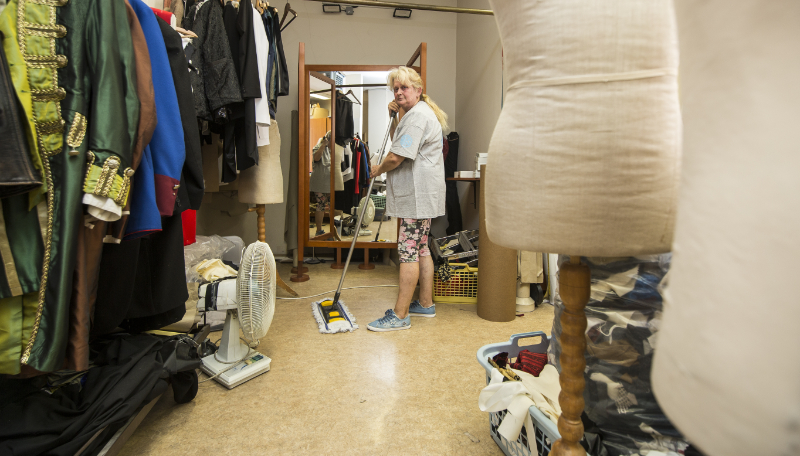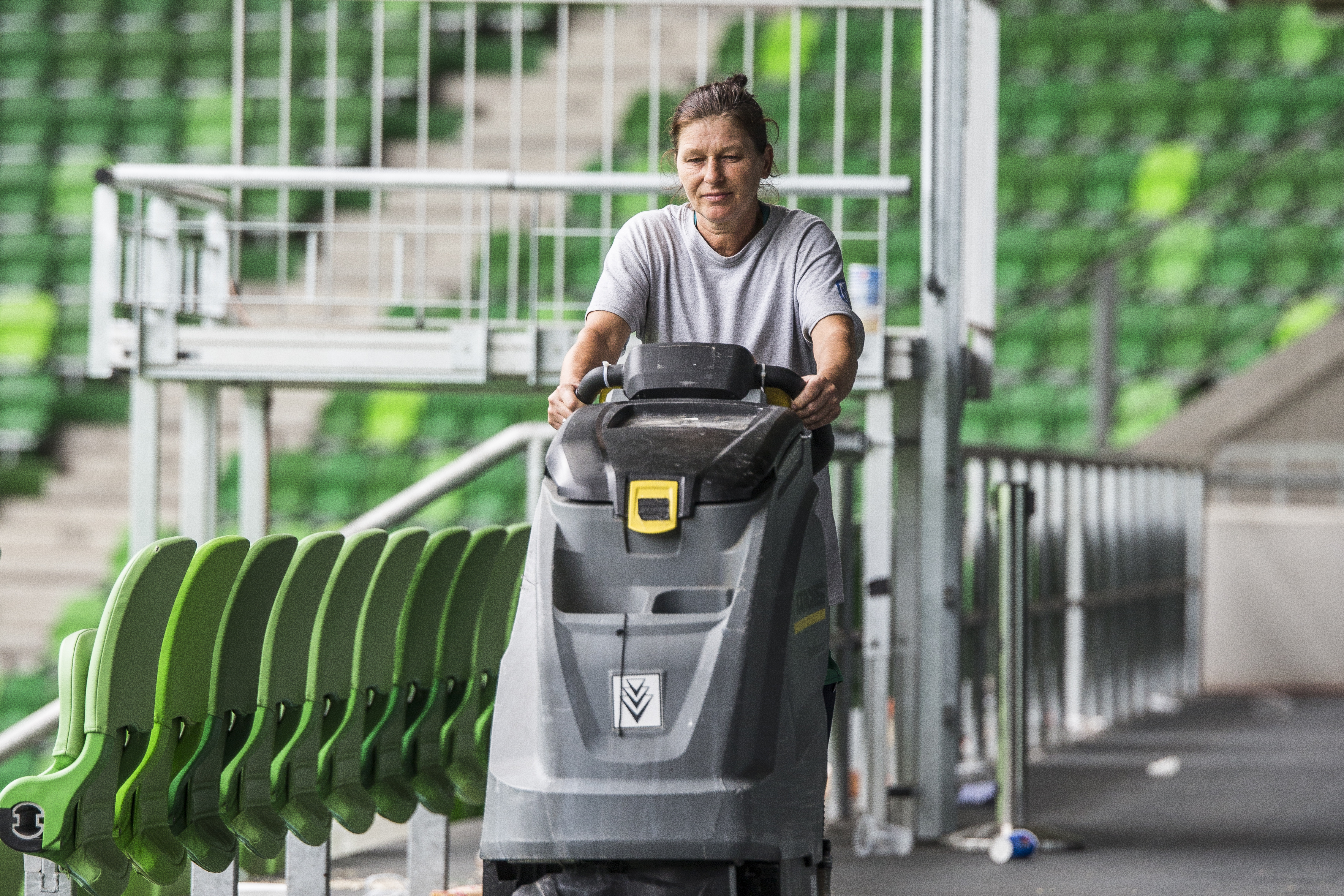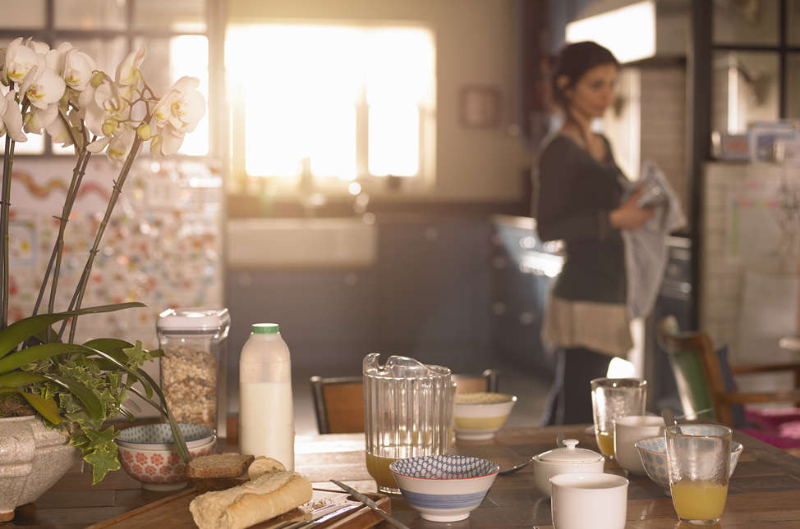
Many people take it is a personal failure if they cannot cope with the household chores, although it is often a quite unrealistic expectation to have a sparkling clean home at all times. And not only in families where the household chores are shared disproportionately: if everyone works a lot, cleaning takes away the very time the family would need to spend together and rest. But why then is it so difficult for us to ask for help? By Adri Csepelyi.
What else does it take for me to see?
I have a picture from six years ago. I am not an out and out toilet selfie person, but I clearly remember how miserable I felt then and I thought to myself: I have to record this. Wrist brace on my left hand, neck brace on my neck. By that day, I had been going to work like that for weeks and typed on the keyboard with one hand (of course I had to type just as much as ever) while trying to clean up the leftover from a flat refurbishment.
My wrist was under examination for months, it was full of ganglion cysts. They shot my wrist full of steroid injections, but they could not promise me anything positive. The doctor could only repeat the phrase: “let it rest”. Sure, thanks.
So there I stood, with my wrist and neck braces on, mortified by the thought that by overburdening my right hand during the refurbishment, my right hand might meet the same fate as the left, making me virtually unable to work. And yet I couldn’t make up my mind to ask for help.
Why, what kind of a housewife are you if you cannot take care of your job?
Questions like this were revolving around my head whenever the conversation steered in the direction of the huge pile of creased clothes waiting to be ironed on the couch, some of them still in bags. While both of us worked 12-14 hours a day.
Being mocked or reprimanded for this by women in a bigger company didn’t help too much either when I admitted I didn’t feel I could run the household all alone: I received untactful household tips as well as open roasts about how well it goes for others.
‘Thanks, I’m happy for you’, I thought to myself, but remained silent as it only strengthened the sense of shame in me. Others easily balance a clean household with 2 kids and 26 cats. It seems I am the only loser here!
Boy, did you strike it rich!
The other typical response I heard was: ‘Is it going so well for you that you are keeping a cleaner?’
These comments were always a mixture of envy, jealousy, stereotypes and ignorance. I mean everyone has the time to do the dishes and dust the furniture in the evening, right? Yeah, sure, everyone. (I would take a good look at my neighbours’ face when I got home at half past 11 at night to start the washing, dishwashing and drying. I’m sure they would love it!) And of course it is beyond question that it is only a question of time, it’s impossible that somebody is exhausted or too tired for the task.
We all know this feeling. Then why is it still a taboo to ask the help of a professional cleaner?
After the numerous social norms of the 20th century (from the turn-of-the-century servant culture to the mirelite food culture of Communist working women), we began our journey into the 21st century with more social stereotypes than we realize. ‘You have a dishwasher and a washing machine, don’t you? Then what’s your problem? Our ancestors managed just fine even without these gadgets!” Boy, if I had as many bucks as I have heard these comments!
So when my husband, for the thousandth time, offered to find someone to help us, I still resisted furiously.
I would have taken it as a personal failure if we had had to hire somebody.
At the other end of the mop handle
I used to work as an office manager, meaning that beside a few administrative tasks, I was cleaning the office. I never had any reservation against it: work is work, I am trying to do it properly and that’s all. If the task happens to be cleaning up a soiled toilet than I will do that and that’s it.
I didn’t feel it humiliating, although I had seen quite a lot of things. The general experience was that people didn’t care what was going to happen with the toilet after they had used it and many people were painfully unaware of even the most basic hygienic rules. When they found out my profession, I sometimes met strange grimasses and quip remarks. There were some even among my co-workers (working in other positions) who talked to me condescendingly when my services were required – even though before my help, the office virtually came to a halt.
But what are all these stereotypes?
Ever since then, I have asked myself a lot if one side of it is so natural, why does the other cause such a dilemma? Why don’t we respect a job which is first and foremost a profession – having dealt with all those burnt clothes, bleach stains, and ruined furniture, I have no doubt about it –, secondly a matter of trust?
Because giving someone full insight into our lives and a key to all our valuables is nothing but a matter of pure trust. Even in a romantic relationship, such trust builds up in time and doesn’t form overnight.
I was born in the countryside in the 80s, for a long time I didn’t even know that people could have housekeepers. The first time I met this phenomenon was maybe through American series (Dallas, The Bold and the Beautiful), and later Brazilian soap operas, instantly pumping a lot of misconceptions in my – and probably others’ – mind.
In soap operas, the owners talk to cleaners as if they were dogs. They look down on them because they are poor and they boss them around as if they were slaves. (As far as I could tell, in productions like Isaura or Wild Angel these roles even blend together…). Only the rich can afford to hire cleaners – and we are certainly not rich, since richness is what we saw in Dallas. Smack!
The missing link
After a while I realized I won’t manage on my own and asking for help got me back on the right track.
My daily routine reorganized, a huge weight rolled of my back and finally we didn’t feel the soul-crushing inadequacy.
Needless to say, everything did not magically get solved. The household is still a mess sometimes. What changed is that I don’t feel it is going to drive me crazy anymore. What I feel is we have better and worse weeks, but every Thursday the help comes and our anxiety is kept at bay.
If you ask me, this is priceless already. I don’t want to sound too bombastic, but there have been numerous occasions on gloomier Thursdays when it was only Évi, who stopped me from collapsing – which makes me immensely grateful for her.
A good cleaner helps your spirit just as much as your physical comfort.
When you have to admit you can’t do it on your own
Although I know all too well that in most cases this decision is the result of a long emotional struggle, I thought I would write down a few points that helped me make up my mind. Here are a few thinking points to decide whether it’s worth taking the leap.
The rational part of the question is quite easy to decide: if the work you can’t do because you are doing the housework pays more than what a cleaner’s help would cost, don’t hesitate. Your remorse will not pay the difference.
- If the stress of household problems is taking its toll on your marriage or your peace of mind, it’s worth sitting down and discussing whether you can do it on your own or you should hire somebody.
- Your asking for help is NOT your failure. It is not a failure at all and if somebody wants you to feel bad about it, they are simply wrong to do so.
- Don’t compare yourself, your household or your performance to that of others’! As my grandma says: ‘I feel the weight of my issues’. Only you can feel yours.
Source: wmn.hu

